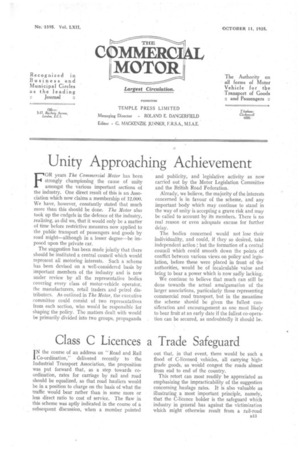Unity Approaching Achievement
Page 27

If you've noticed an error in this article please click here to report it so we can fix it.
FOR years The Commercial Motor has been strongly championing the cause of unity amongst the various important sections of the industry. One direct result of this is an Association which now claims a membership of 12.000. We have, however, constantly stated that much more than this should be done. The Motor also took up the cudgels in the defence of the industry, realizing, as did we, that it would only be a matter of time before restrictive measures now applied to the public transport of passengers and goods by road might—although in a lesser degree—be imposed upon the private car.
The suggestion has been made jointly that there should be instituted a central council which would represent all motoring interests. Such a scheme has been devised on a well-considered basis by important members of the industry and is now under review by all the representative bodies covering every class of motor-vehicle operator, the manufacturers, retail traders and petrol distributors. As outlined in The Motor, the executive committee could consist of two representatives from each section, who would be responsible for shaping the policy. The matters dealt with would be primarily divided into two groups, propaganda and publicity, and legislative activity as now carried out by the Motor Legislation Committee and the British Road Federation.
Already, we believe, the majority of the interests concerned is in favour of the scheme, and any important body which may continue to stand in the way of unity is accepting a grave risk and may be called to account by its members. There is no real reason or even adequate excuse for further delay.
The bodies concerned would not lose their individuality, and could, if they so desired, take independent action ; but the formation of a central council which could smooth down the points of conflict between various views on policy and legislation, before these were placed in front of the authorities, would be of incalculable value and bring to bear a power which is now sadly lacking.
We continue to believe that much can still be done towards the actual amalgamation of the larger associations, particularly those representing commercial road transport, but in the meantime the scheme should be given the fullest consideration and encouragement as one most likely to bear fruit at an early date if the fullest co-operation can be secured, as undoubtedly it should be.




























































































